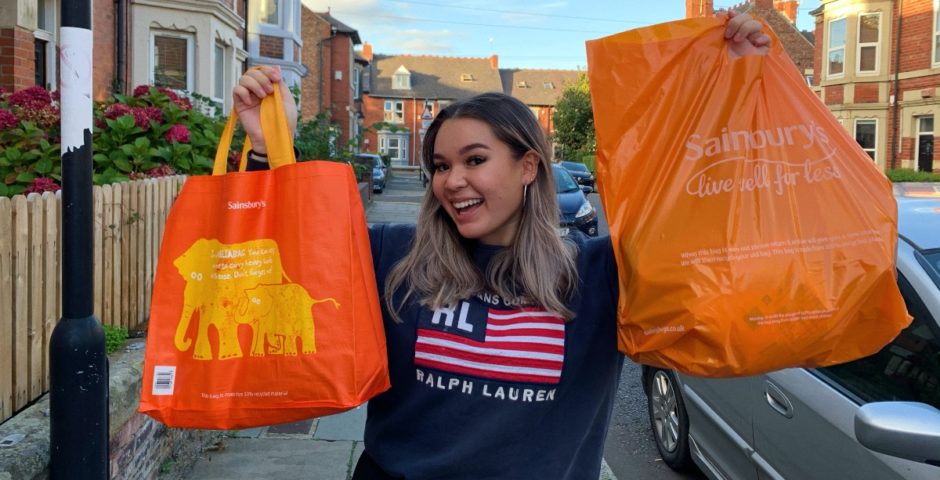
How to make your food shop more sustainable as a student
It’s not as hard as you think!
It can be difficult to shop in a way that is environmentally friendly, and it can be confusing about where to even start. Everything we do has some kind of impact, and it’s about doing our best wherever we can. There are loads of factors to consider, but here are some of the main things to think about when you’re doing your next food shop.
Buy locally
Shipping of foods from overseas is a major issue, both in terms of fuel consumption and damage to the wildlife and biodiversity of supplier countries. In 2016, a study found that more than half of the UK’s food and feed now comes from overseas. Our food supply chains are now so globalized that it is incredibly difficult to only eat foods produced in the UK, or even just Europe, (if you can get food grown in the North East, even better!), but where possible check labels and try to buy as close to home as you can. Buying more local produce is not only better for the environment but also supports the local economy, the produce is likely to be fresher, and it also helps you connect more to the food that is native to the UK.
Eat more vegetables
It has been proven that eating more vegetables and reducing the amount of animal products you eat does have a better environmental impact. You don’t have to go veggie or vegan to make your diet a little more sustainable – in fact doing so overnight is incredibly difficult and almost never works – but it’s definitely worth implementing a few more meatless meals into your repertoire (and you can also have bigger portion sizes too!). There are lots of incredible vegan and veggie cafes and restaurants in Newcastle, so if you need an excuse for a takeaway (it’s fine because it’s supporting local businesses, right?) try something plant-based!
Buy seasonally
This ties in a lot with buying locally. If you buy what is in season in the UK, it will mean that less resources are used to grow these items in more artificial circumstances. You also be totally reliant on food flown halfway around the world. Again, this can be quite difficult to do, but the website Eat the Seasons and the company Too Good to Go’s Instagram page are really useful resources to help familarise yourself with what foods are in season when, and to then use that information as a basis base some of your meals around them.
Buy the ‘ugly’ vegetables
You know the ones… They look a little bit bashed or have a weird kind of bump on the side. They don’t fit into our image of a perfect fruit of vegetable, so they don’t get bought as frequently, and supermarkets are more likely to stock and feature aesthetically pleasing fruit and veg, even though fruit and veg of all shapes and sizes taste just as good and are just as nutritious. In fact, in 2013 it was reported that 40% of fruit and vegetables are wasted because they didn’t meet the right aesthetic standards.
In recent years we have seen a rise of ugly veg in our supermarkets, however a significant amount is still wasted before it even gets to the shelves. Buy these ugly veg and stop them being thrown away! Show that customers don’t care if their food is pretty, as long as it still tastes good, so supermarkets continue to stock more.
Cut out plastic where possible
The issue of plastic pollution has become much more prominent in recent years, and has become a bit of a trend, but for good reason! Less than a fifth of all plastic is recycled globally, and it is estimated that every day approximately 8 million pieces of plastic find their way to our oceans.
Remember those tote bags you got during Freshers’ Week? Put them to use! Keep one in your bag at all times so you’re never caught out, and bring more with you when you know you’re going out specifically to get food.

There are several ways to do this, and no one can be absolutely perfect – plastic is everywhere! – but try where you can. The obvious way to use less plastic is to buy products either package-free or from bulk/zero waste stores. There are several of these kind of shops in Newcastle, including two in Grainger Market, but you can also often find lots of vegetables plastic-free in many supermarkets.
One staple business in Grainger Market is Fruit and Nut, which, although its name has rubbed off the wall, is recognizable by its huge bins of flour, dried legumes, dried beans, nuts, pasta and more. It is a genuine treasure trove of bulk foods and has been there for years. More recently, another shop opened up in Grainger Market called Nil Living, which more specifically markets itself as zero waste, and has a lot more household/non-food items.
109 General Store in Heaton also has food available without packaging, including oil and spices, as well as some soaps and other liquid refills.

Even if you can’t buy some items without packaging, have a look and see if they’re sold in non-plastic packaging like jars or tins. These materials are less damaging to the environment and are much easier to recycle. Think of meals which can be totally made up of tinned foods and unpackaged veg (a bean chilli is a great example of this!), and you’ll find there are actually more possibilities than you previously thought.
If you can’t find certain items without plastic packaging and can afford to spend a little bit more money, buy larger packs of foods. There will be less overall packaging, so less wasted! Like any bulk buying, this applies especially for staples like pasta and rice. This isn’t the best solution (if you can opt for items with either no packaging or not made of plastic, go for those), but it still reduces waste and as Tesco always like to tell us, every little helps!
Try to avoid impulse buys
Impulse buys are a sustainability nightmare! The subject of cravings and whims, they’re items you probably don’t need and may not use up entirely.
To help reduce this, don’t shop on an empty stomach, try to have some idea of the meals you’re going to make before you buy anything or try to buy ingredients you know can be used in multiple different ways (for example, frozen peas can be added to almost anything), and try to have some kind of list with you no matter if you’re physically going to a shop or are shopping online.
But you know what, sometimes you’ve had a bad day, and all you need is a vegan chocolate cupcake from the SU Co-op, and there is absolutely no shame in that.

And remember…
It’s okay not to be perfect. Very few people can do all of these things all of the time, so cut yourself some slack. Try your best and make small changes, that’s all anyone can ask for.
Want to break stories like this? Join the team, no experience required. DM us via @TheTabNewcastle on Instagram or The Tab Newcastle on Facebook.
Recommended stories by this writer:
• From making costumes to marching: How to help the environment as a student
• Newcastle names as the second best uni in the world for recycling and sustainability









































